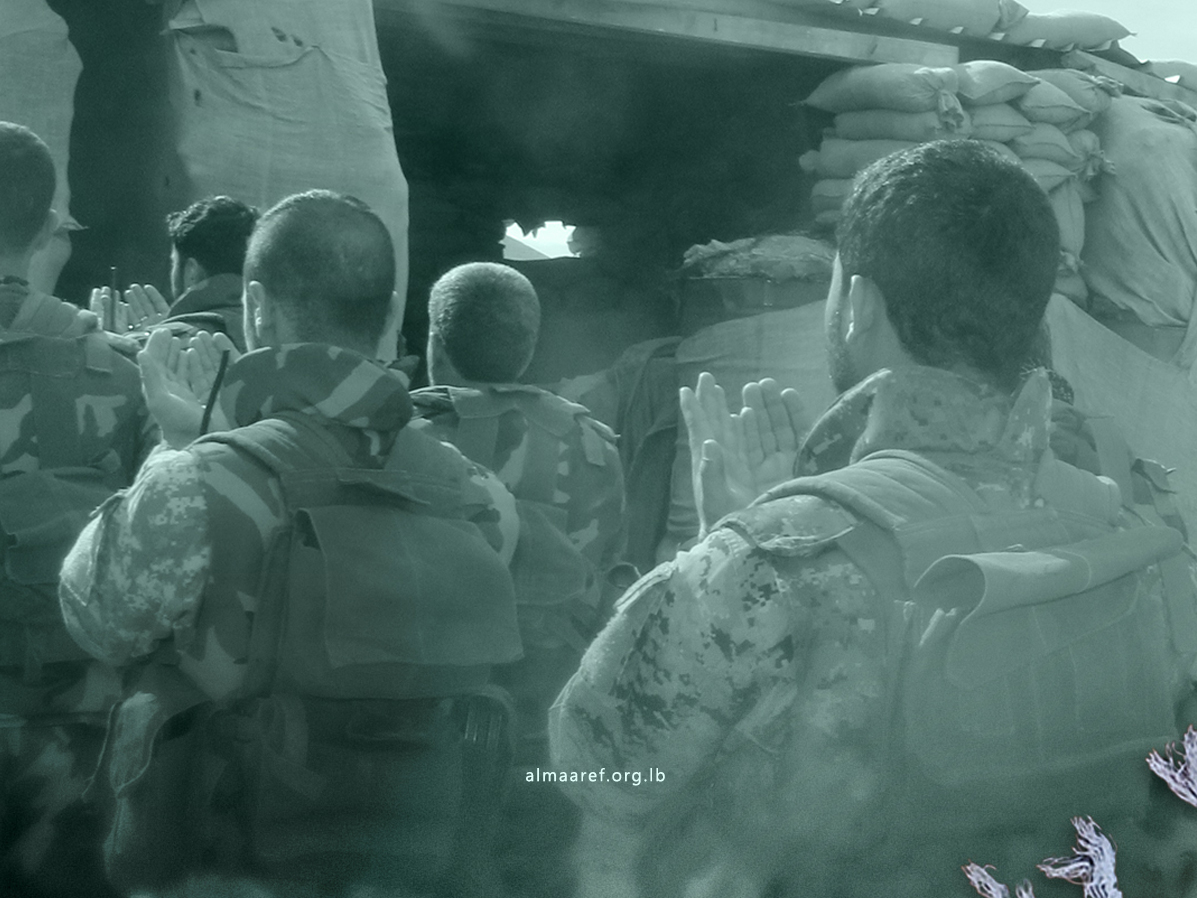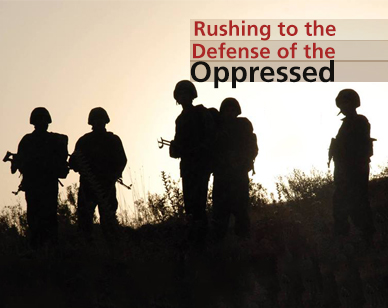What are Al Mujahidin Manners?
Bravery
Bravery is a trait that’s created in the human self through training it on facing what it fears. It’s a trait that a fighter for the sake of God (mujahid) should have; it’s one of the ethical backgrounds.
Bravery is one of the branches of patience. Only a patient man is a brave man. Therefore, Al Imam Ali (a.s) says: “Bravery is a one hour patience.”[1]
Al Imam Al Hasan (a.s) also said when asked about bravery: “It’s the agreement with peers in patience in the time of conflicts.”[2]
Bravery also is one of the branches of high aspirations that we have mentioned in the previous lessons. A man of high aspirations doesn’t accept to be among those who are afraid, sitting in the holes frightened from ascending the mountains. But a brave man is a man whose high aspiration encourages him to reach the highest ranks and phreaking conflicts with all courage. This is what Al Imam Ali (a.s) means when saying: “A man’s bravery depends upon his self-respect and his chastity depends upon his sense of honor.”[3]
Bravery is among the traits that Allah almighty loves a believer to have. Many holy hadiths have insisted on this idea. For example, the prophet Muhammad (pbuh) says: “Know that Allah loves effective foresight in the presence of desires, full mind in the presence of suspicions, and bravery even when killing a snake.”[4]
Power
The power we're talking about isn’t the physical power or the shape of muscles, but we’re talking about another power that makes a man able to finish his work perfectly.
This is what Al Imam Al Sadiq (a.s) has clarified when saying: “The power of the believer is in his heart, don't you see you find him weak, slim-bodied as he does the night and fast the day?”[5]
Power originates from continuous and persistent work. However, laziness, and laxity and wriggle in finishing work, all leads to the dullness and weakness of a fighting man. For this, Al Imam Ali (a.s) says: “He who works becomes more powerful, and he who shortens in his work becomes colder.”[6]
Whoever feels weakness in themselves, or inability to fulfill their duty, must always remember that Allah does not love the weak believer, and that the strong believer is more beloved to Allah than the weak ones. In the narration from the Noble Prophet (pbuh): “The strong believer is better and more beloved to Allah than the weak believer, and in both there is good. Be keen on what benefits you, seek help from Allah, and do not be helpless. If something befalls you, do not say, ‘If only I had done such and such, it would have been this way or that,’ but rather say, ‘It was the decree of God, and what He willed, He did,’ for ‘if only’ opens the door to the work of Satan.”[7]
One must also plant in their heart the idea that they should not be a burden or a dependent on others, for failing to fulfill one’s duties is a violation of the religious command, and it is also a moral wrongdoing against both the work and the workers.
Firmness and Steadfastness
God Almighty says in His glorious book: “So to that [religion of Allah] invite, [O Muhammad], and remain on a right course as you are commanded and do not follow their inclinations and say, ‘I have believed in what Allah has revealed of Scripture, and I have been commanded to do justice among you. Allah is our Lord and your Lord. For us are our deeds, and for you are your deeds. There is no need for an argument between us and you. Allah will bring us together, and to Him is the [final] destination.’”[8]
This noble verse refers to two concepts of great importance for anyone fulfilling a divine role: firmness and steadfastness.
It is not enough for a person to carry out their duty in any way they choose. They must first be firm in fulfilling that duty, meaning they should not accept any form of delay or laxity in implementation. Firmness in carrying out obligations is a required and divine command for anyone who undertakes an action.
Al Imam Ali (a.s) says: “No one upholds Allah’s command except he who is uncompromising, unwavering, and does not follow personal desires.”
[9]
The consequence of lacking firmness is humiliation on the Day of Judgment, as mentioned by Al Imam Al Sadiq (a.s) : “Beware of neglecting Allah’s command, for whoever neglects His command, Allah will humiliate him on the Day of Judgment.”[10]
The second concept is steadfastness, which means remaining steadfast on the path and not wavering due to unexpected circumstances that may cause some people to deviate. Some people follow a particular political path as long as it appears to benefit them. However, if something arises that opposes their desires or wishes, they may shift to another path they believe will fulfill their ambitions. This kind of person is what the Ahlul Bayt (pbuh) refer to as a “chameleon.” Al Imam Ali (a.s) said: “Know that Allah, the Blessed and Exalted, hates the chameleon among His servants. So, do not deviate from the truth and the guardianship of the people of truth, for whoever replaces it perishes.”[11]
Steadfastness is a sign of a true believer, and it is the result of one’s persistence in adhering to principles during trials and tribulations. Al Imam Al Sadiq (a.s) says: “The believer has strength in faith… and righteousness in steadfastness.”[12]
Moreover, steadfastness has an important consequence which is safety. This safety does not refer to the physical body but rather to the soul, which remains safe from falling into Allah’s wrath or sinking into the mire of deviation. Al Imam Ali (a.s) says: “Whoever adheres to steadfastness is guaranteed safety.”[13]
Truthfulness and Trustworthiness
God Almighty describes the believers by saying: “And those who are faithful to their trusts and their covenants.”[14]
These two traits, truthfulness and trustworthiness, are not only traits of a warrior (mujahid) but also of any believer, and they must be especially present in a warrior.
In the hierarchy of Islamic ethics, these two virtues hold the highest ranks, as a believer cannot be dishonest, according to the noble narrations.
The hadiths have made truthfulness and trustworthiness a measure of one’s faith. The Prophet Muhammad (pbuh) says: “Do not look at the abundance of their prayers and fasting, their frequent pilgrimage and good deeds, or their chanting during the night, but look at the truthfulness of their speech and their fulfillment of trust.”[15]
Beyond all this, truthfulness and trustworthiness are paths to achieving the highest levels of faith and nearness to Allah Almighty. Al Imam Al Sadiq (a.s) tells us about the state of his grandfather, Al Imam Ali (a.s), saying: “Observe what elevated Ali in the sight of Allah’s Messenger, and adhere to it. Indeed, Ali reached his position with Allah’s Messenger through his truthfulness and fulfillment of trust.”[16]
* The Elite of the Righteous, Al Maaref Islamic and Cultural Institution
[1] Al Rayshahry, Mohammad, Mizan Al Hikmah, Dar Al Hadith, the 1st edition, hadith 9157
[2] Ghurar Al Hikam: 5763
[3] Ghurar Al Hikam: 5763
[4] Ibn Salamah, Wafat: 454, Musnad Al Shihab, Al Risala Association, Beirut: 2-152- 1080
[5]
[6] Ghurar Al Hikam: 7990, 7991.
[7] Al Nishapuri, Muslim bin Al Hajjaj, Sahih Muslim, Dar Al Fikr, Beirut, Lebanon: 4- 2052- 34
[8] Surah Ash-shura verse 15
[9] Nahjul Balagha, wisdom 110
[10] Al Barqi, Ahmad bin Muhammad bin Khalid, Al Mahasen, Islamic Books Publishing House, Tehran: 1- 181- 286
[11] Al Majlisi, Muhammad Baqir Al, Bihar Al Anwar, Al Wafaa Association, The corrected second edition, 10- 105- 1
[12] Sheikh Al Kulayni, Al Kafi, islamic Book Publishing House, Akhondi, Third Edition, 2- 231- 4
[13] Al Majlisi, Muhammad Baqir, Bihar Al Anwar, Al Wafaa association, The corrected second edition, 78- 91- 95
[14] Surah Al Mu’minun verse 8
[15] Al Majlisi, Muhammad Baqir, Bihar Al Anwar, Al Wafaa Association, The corrected second edition, 75- 114-
[16] Sheikh Al Kulayni, Al AKfi, Islamic Books Publishing House, Akhondi, #rd edition, 2-104- 5



















